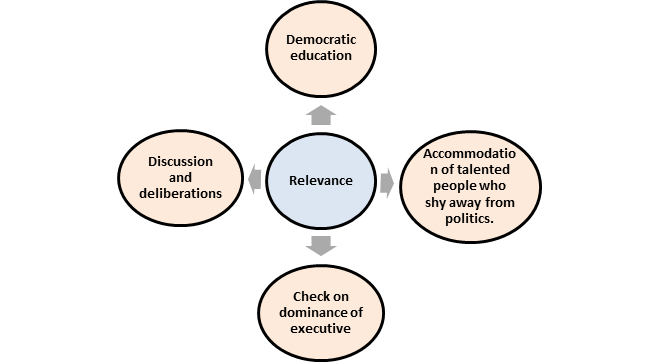Chief Minister and Council of Ministers
Constitutional Provisions
-
- Article 163: Council of Ministers aids and advises the Governor, except in discretionary matters.
- Article 164: Chief Minister is appointed by the Governor; Ministers serve at the Governor’s pleasure.
- Article 166: Governs the conduct of state government business.
- Article 167: Chief Minister must keep the Governor informed about government decisions.
- Article 177: Ministers have the right to participate in legislative proceedings but can vote only if they are members of the House.
About Chief Minister:
-
- Appointed by the Governor, usually the leader of the majority party.
- Allocates/revokes portfolios, presides over meetings, and coordinates ministers.
- Chairs the State Planning Board, part of Inter-State Council & NITI Aayog, key crisis manager.
About Council of Ministers
-
- Appointed by the Governor, on advice of Chief Minister.
- Cannot exceed 15% of the Assembly strength; minimum of 12 ministers.
- Types of Ministers:
- Cabinet Ministers: Head key departments, attend cabinet meetings.
- Ministers of State: May have independent charge or assist Cabinet Ministers.
- Deputy Ministers: Assist senior ministers; do not attend Cabinet meetings.
- Deputy Chief Minister: Sometimes appointed for political/administrative reasons.
- Collective Responsibility (Article 164)
- Entire council is accountable to the Assembly.
- No-confidence motion against the Council leads to resignation of all ministers.
- Individual Responsibility (Article 164)
- Ministers serve at the pleasure of the Governor but can be removed only on the advice of Chief Minister.
- No Legal Responsibility
- Ministers are not legally bound to countersign Governor’s orders.
Working of the State Legislature
| Positive | Negative |
|---|---|
| • Some legislatures have regularized process and functioning of assembly and have maintained proper records of live proceedings. • They have enacted some innovative legislations like RTI, Lokayukta Act etc. • They have played an important role in upholding the responsibility of executive. | • Lack of research and studies related to law-making. • Over 47% of MLAs have criminal background. • The role of Governor and Speaker sometimes make the situation worse because of politically motivated decisions. |
Legislative Council and its relevance
About:
-
- The Legislative Council aka Vidhan Parishad is the upper house in a bicameral state legislature.
- It plays an advisory and reviewing role in state legislation.
- Six states have a Legislative Council: Bihar, Uttar Pradesh, Maharashtra, Andhra Pradesh, Telangana, and Karnataka.
Constitutional Provisions:
-
- Article 169: Parliament can create or abolish a State Legislative Council based on a resolution passed by the State Assembly.
- Article 171: Defines the composition of the Legislative Council.
- Article 172: Specifies that Council members have a six-year term, with one-third retiring every two years.
Relevance:

State legislature speaker
About:
-
- Presiding officer of the Legislative Assembly (Vidhan Sabha) under Article 178.
- Ensures smooth functioning, discipline, and order during legislative proceedings.
- Chosen from among Assembly members.
- Can resign by submitting to the Deputy Speaker.
Powers & Functions:
-
- Maintains order and ensures discipline in Assembly debates.
- Decides whether a bill is a Money Bill (final decision).
- Votes only in case of a tie (casting vote).
- Can adjourn or suspend House proceedings in case of disorder.




